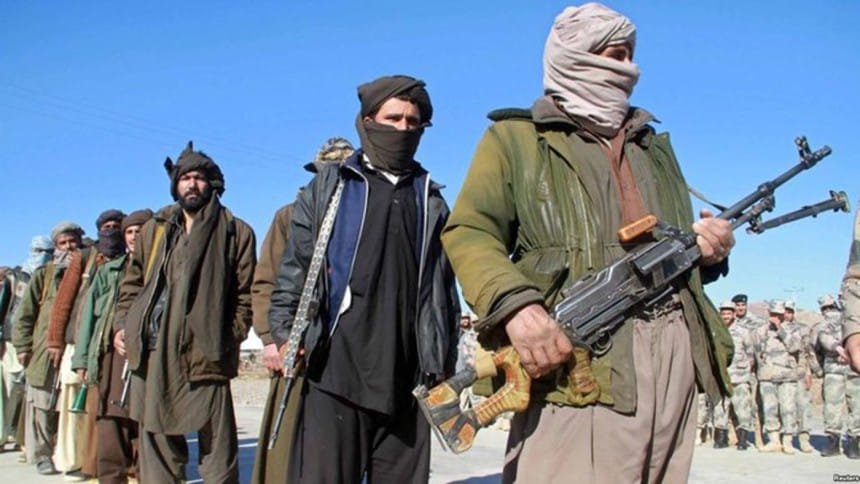Resurgence of Taliban in Afghanistan and its effect on Bangladesh

The last batch of US-led NATO troops left Afghanistan's Bagram Airfield in early July of this year. They have been attacking Al-Qaeda and the Taliban in Afghanistan from this airfield for the last 20 years.
A few days ago, US President Joe Biden had a meeting with the visiting Afghan President Ashraf Ghani. What Biden said after the meeting was that Afghanistan will have to decide what happens next. Support would continue though, he added. That means, after a long period of geopolitical use, the US administration no longer wants to take any responsibility for the ongoing situation in Afghanistan, which has been in the throes of a bloody conflict for nearly 20 years.
At a time when Biden is preaching, NATO troops are leaving and on the other side, the Taliban are on a mission to occupy Afghanistan. The Taliban have expanded their dominance in rural areas of western Afghanistan. Now they are moving towards the major cities. They are occupying the districts. There have even been reports that 260 Afghan soldiers have fled to Tajikistan in the face of Taliban attacks. A few days ago, the Taliban launched an attack on the regional capital. After the Qala-e-Naw attack in western Afghanistan, there have been reports of clashes between Taliban and Afghan forces. With everything that is happening, everyone is concerned about Afghanistan.
America retreating like this is not new. They have provoked regional instability by creating complexities in the name of democratising Afghanistan and fighting a war on terror. The consequences of any military alliance led by them have always been the same. They have done the same thing in Vietnam and Iraq. While the war in Vietnam had created new areas of conflict during the Cold War, the experience of Iraq is even grimmer. Today, everyone knows that the reasons for the Anglo-American alliance's invasion of Iraq were baseless. But that invasion paved the way for terrorism around the world to increase and created new extremist forces like the IS, not only in Iraq, but all over the world.
The US supported the Taliban—or the Mujahideen—in the early 1990s to fight against the Soviet Union. It was after 9/11 that the US started its anti-Taliban activities. Today, John Bolton, a former US security adviser, says that Pakistan is responsible for the rise of the Taliban! Most former and current US policymakers like him hide the fact that the militants have emerged in areas around the world where they have created chaos and unrest. It can be seen that the rise and actions of these militants have always favoured their geopolitical interests at the end.
The strengthening of the Taliban in Afghanistan did not stop its influence in that country alone. Pakistan, Bangladesh and even India were influenced by the rise of such forces. The Taliban had established contacts with extremists in Bangladesh and they also developed close ties with radical political parties. We heard them chant slogans in their processions in the nineties that Bangla shall be Afghan and they will all be the Taliban!
We have seen how Bangladeshis have travelled to Afghanistan and fought for the Taliban. After returning to Bangladesh, they have not only created militant organisations like Harkatul Jihad or HUJI, they have tried to destroy the progressive politics of the country as well. They have strategically expanded their organisation by choosing their political allies, and to do so, they have received money from the Taliban. The impact of the rise of the Taliban in the country was even clearer when one read the statement made before the execution of JMB leader Shaykh Abdur Rahman. Shaykh Abdur Rahman made contact with Afghani and Pakistani militants before entering the JMB with the help of Bangla Bhai. He also had a meeting with HUJI on that basis. The unity of progressive politics in the country did not allow them to succeed in the end. But they are yet to be fully stopped.
According to media reports, intelligence officials have found the involvement of Afghan militants in the violence of Hefazat-e-Islam in the country a few days ago. They are working on different strategies together. While staying in India, Salahuddin alias Salehin, the current Amir of JMB, has been organising militants in the country. A militant arrested in Dhaka a few months ago has confessed that he went to India and met him. It is not difficult to see from past experiences that the return of the Taliban to full power in Afghanistan will again fuel this radical group in Bangladesh.
Is this a danger only for our country? India, one of the largest countries in Asia, cannot avoid such influences either. According to media reports, JMB's Salahuddin has reportedly worked with militant groups inside India. Hefazat's vandalism in March 2021 was also focused on the Indian prime minister's visit to Bangladesh. It cannot be ruled out that the rise of the Afghan Taliban will create a new crisis in Kashmir. There is nothing new to say about the Taliban's position inside Pakistan. As a result, just as a bloody Iraq affected the stability of the entire Middle East, a conflict-ridden Afghanistan could in fact destabilise the whole of South Asia.
So, we all need to focus on the future crisis brewing in Afghanistan now. It is not a headache of any single state. If the South Asian countries cannot work together on this issue with a common goal of achieving regional stability, then everyone will have to pay the price for it in the future.
Fazle Hossain Badshah is a Member of Parliament from Rajshahi-2.

 For all latest news, follow The Daily Star's Google News channel.
For all latest news, follow The Daily Star's Google News channel. 



Comments